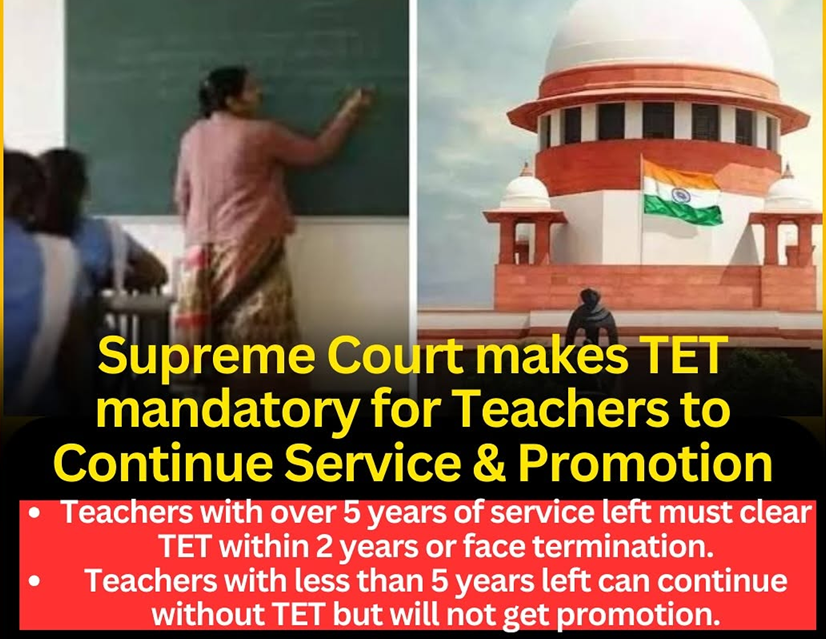PREVIOUS
Supreme Court verdict on TET exam
October 6 , 2025
14 hrs 0 min
24
0
- Tamil Nadu became one of the first States to seek a review of a Supreme Court judgment on TET.
- It gave school teachers two choices — to qualify for Teaching Eligibility Test (TET) in two years or be retired compulsorily.
- On September 1, 2025, a two-judge Bench of Justices Dipankar Datta and Manmohan invoked the court’s extraordinary powers under Article 142 of the Constitution.
- It has directed that teachers across the country with more than five years of service left must pass the TET in two years.
- The Right to Education (RTE) Act of 2009 was implemented from 2010.
- It required teachers to clear TET.
- The Bench only gave teachers with less than five years to retirement the option to not take TET.
- It is applicable to all teachers employed in government, aided, unaided and private schools mentioned under the Right of Children to Free and Compulsory Education (RTE) Act, 2009.
- It requires in-service teachers from Classes 1-8 in non-minority schools across the country to clear the Teachers’ Eligibility Test (TET) in two years or be “compulsorily retired”.
- Further, the two-judge Bench judgment referred to a larger Bench the question whether minority educational institutions ought to be also included under the purview of the RTE Act.
- The two-judge Bench criticised a 2014 Constitution Bench judgment in the Pramati Educational and Cultural Trust case
- That case took minority institutions entirely outside the ambit of the RTE Act.
- The September 1 judgment made a strong pitch to bring schools run by minorities — whether religious or linguistic — into the RTE fold.
- At the centre of the controversy is the interpretation of Section 23 of the RTE Act.
- As per that, the National Council for Teacher Education (NCTE) has laid down minimum qualifications for a person to be eligible for appointment as a teacher in Classes one to eight.
- It was done through its notification on August 23, 2010.
- An essential qualification is passing the TET conducted by the appropriate government.
- The rationale for including the TET is to bring national standards and the benchmark of teacher quality in the recruitment process.
- But, Tamilnadu argued that the RTE law and norms cannot be applied retrospectively.
- In its review petition, Tamil Nadu contended that the Section 23(1) would apply only to future recruitment of teachers.
- The State also referred to Section 23(2).
- It empowers the Centre, through notification, to relax the minimum educational qualifications for appointment of teachers for a limited period not exceeding five years in case States have to deal with contingencies of dearth of teachers or institutional shortages.
- A proviso appended to Section 23 also makes it clear that any teacher who, at the commencement of the RTE Act, did not possess the minimum qualifications (TET) must acquire such qualifications within a period of five years.
- Section 23 does not call for a “blanket mandate” for TET nor could the interpretation of the provision be stretched to retrospectively disqualify teachers who were validly appointed before the notification of minimum qualifications (TET).
- The review petition is generally filed by one of the aggrieved parties in a case
- It is requesting the Court to reconsider its earlier order passed by it.
- The review petition is basically heard in a chamber hearing without the presence of any parties, lawyer (s), litigants or anyone.
- The same judge (s) who pronounced the earlier order/ verdict hear the case again and pass the order, after going through the case.
- The judges take approximately half an hour or so to pass the order in the matter.

Leave a Reply
Your Comment is awaiting moderation.


